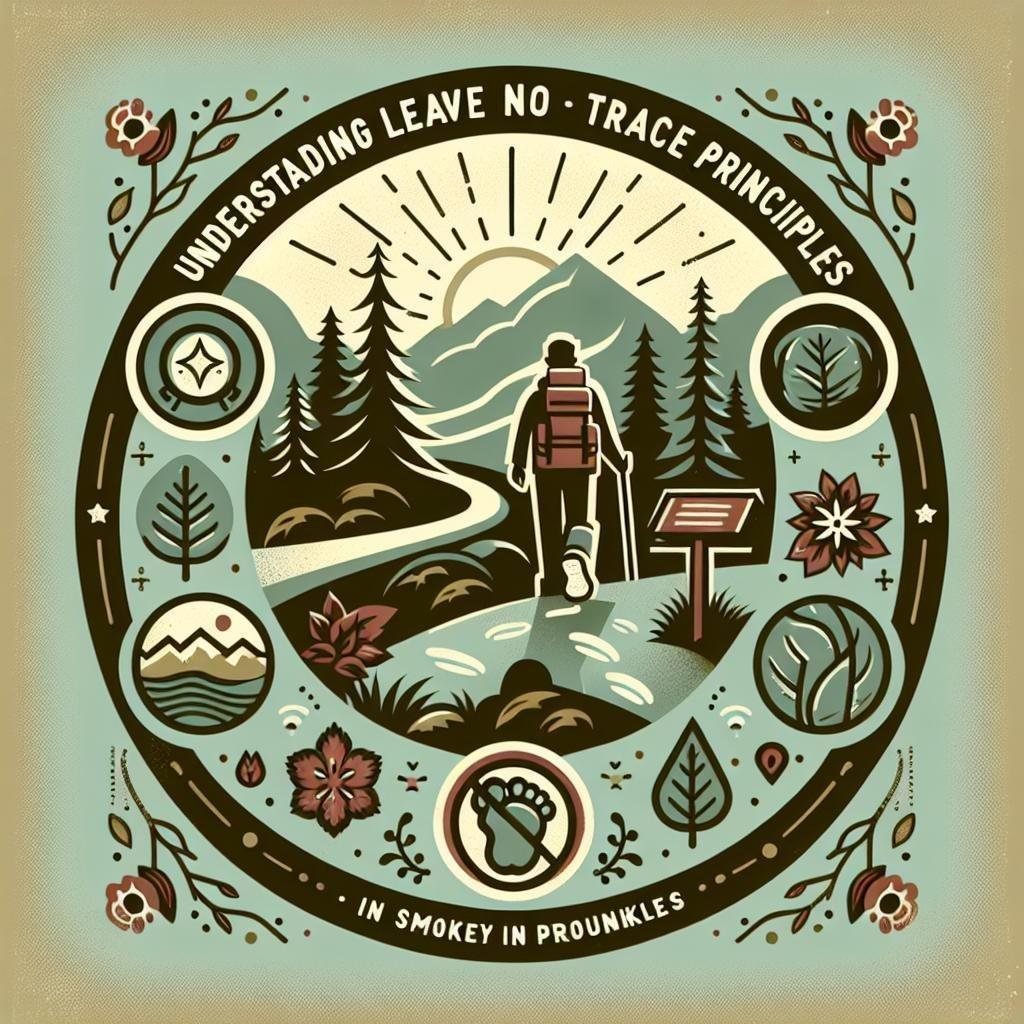In the heart of the Appalachian wilderness lies a realm where nature’s grandeur unfolds in its most pristine form—the Great Smoky Mountains. Here, as fog-laden mornings give way to sun-dappled afternoons, hikers from around the globe are drawn by the allure of these ancient peaks and verdant forests. Yet, with the growing influx of visitors, the imperative to preserve this fragile ecology has never been more urgent. Enter the Leave No Trace principles—a set of guidelines that champion the ethos of sustainable exploration. Whether you’re a seasoned adventurer or a curious newcomer, understanding and embracing these principles is crucial for ensuring that the Smokies’ trails remain unspoiled havens for generations to come. In this article, we delve into the essence of Leave No Trace, exploring how each principle can be seamlessly woven into the tapestry of your hiking experience, fostering a deeper connection with the wilderness while treading lightly upon its sacred grounds.
Mastering the Art of Minimal Impact in Pristine Wilderness
- Plan Ahead and Prepare: Crafting a successful hiking journey begins even before your boots touch the trail. In the Smoky Mountains, unpredictable weather and rigorous terrain demand detailed trip planning. By researching trail conditions, obtaining necessary permits, and structuring a well-thought-out itinerary, you safeguard both your well-being and the pristine environments you explore. Consider packing essentials like maps, a compass, and weather-appropriate gear to minimize reliance on modern devices and mitigate potential impacts.
- Travel and Camp on Durable Surfaces: When embarking on your mountain adventure, it’s crucial to stick to established trails and campsites. Off-trail wanderings can lead to soil erosion and disturb delicate ecosystems. Select camping spots that won’t damage vegetation—ideally those already showing signs of wear—and recognize the importance of maintaining camps away from streams and lakes to safeguard water resources. A commitment to low-impact travel ensures the Smokies remain mesmerizing for generations to come.
| Principle | Benefit |
|---|---|
| Respect Wildlife | Minimizes animal stress and maintains natural behaviors |
| Dispose of Waste Properly | Preserves ecosystem health and aesthetic value |

Embracing Wildlife Harmony While Trekking the Trails
The mesmerizing beauty and biodiversity of the Smoky Mountains attract thousands of hiking enthusiasts every year. As we venture into this natural wonder, it’s essential to respect and preserve its pristine state by adhering to Leave No Trace principles. One fundamental aspect involves being mindful of how our presence impacts wildlife and their habitats. Being considerate of wildlife means observing from a distance, not feeding animals, and ensuring their natural behaviors aren’t altered by our activities. Waste management is equally vital; pack out all trash and avoid leaving any food scraps behind. Small items like apple cores might seem harmless, but they can disrupt ecological balances and attract wildlife to trails.
Preserving the natural environment goes hand in hand with respecting the hikers sharing the trails with you. Keep noise levels to a minimum to avoid disturbing both animals and fellow adventurers seeking solace in nature. Stay on designated trails to minimize vegetation damage and soil erosion, practices which help maintain the environment’s natural state. Equally important is understanding and following any park regulations specific to wildlife interaction. Remember, part of the adventure is sharing the space with the park’s instincts and whispers. Here’s a quick reference guide for hiking courtesy:
| Activity | Best Practice |
|---|---|
| Viewing Wildlife | Use binoculars for a closer look without disturbance |
| Campfires | Use established rings and keep them small |
| Trail Etiquette | Yield to uphill and faster-moving hikers |

Safeguarding Nature’s Bounty Through Thoughtful Practices
The art of minimizing our impact on delicate ecosystems, especially in beloved destinations like the Smoky Mountains, is encapsulated within the Leave No Trace principles. These guidelines are designed not only to protect nature but also to enhance the experience for all who seek solace in its beauty. Careful planning before your adventure is crucial; research the area’s conditions, pack appropriate gear, and ensure that all potential waste is accounted for and packed out. By doing so, hikers can prevent inadvertent harm to trails and wildlife.
While trekking through the lush terrains and serene vistas, it’s essential to consciously tread on durable surfaces. This approach prevents erosion and protects the fragile flora beneath. Moreover, when choosing your campsite, it’s wise to set up at least 200 feet away from lakes and streams to maintain water quality. Practicing respect for wildlife and being considerate of other visitors ensures that everyone can enjoy the pristine wilderness. Remember, small choices can have a grand impact:
- Stay on marked paths to prevent trail widening.
- Dispose of waste properly, carrying out what you carry in.
- Leave what you find, preserving the natural history for others.
- Minimize campfire impacts by using a lightweight stove for cooking.
| Action | Impact |
|---|---|
| Using Reusable Water Bottles | Reduces plastic waste |
| Stick to Trails | Prevents habitat destruction |
| Pack Out All Trash | Keeps wildlife safe and encourages natural beauty |

Empowering Hikers with Tools for Sustainable Adventures
Incorporating Leave No Trace principles into your hiking adventures ensures the Smokies remain pristine for generations. These guidelines are not rigid rules but rather a philosophy that helps hikers harmonize with nature. To start, consider the impact of your gear. Lightweight equipment minimizes trail wear and reduces your carbon footprint. Reusable water bottles, eco-friendly camping gear, and digital maps are perfect tools to leave no impact. Additionally, set a respectful distance from wildlife, keeping your interactions minimal to avoid disturbing their natural behaviors.
- Plan Ahead: Research and adhere to trail regulations and weather conditions.
- Dispose of waste: Pack out all trash, including biodegradable waste like food scraps.
- Respect Wildlife: Observe animals from a distance and never feed them.
- Travel on Durable Surfaces: Stick to established trails to avoid damaging sensitive vegetation.
| Item | Purpose | Benefit |
|---|---|---|
| Eco-friendly Gear | Minimizes Waste | Reduces Environmental Impact |
| Digital Maps | Navigation | No Paper Waste |
| Reusable Water Bottle | Hydration | Eliminates Plastic Waste |
Consider the principle of leaving what you find—embrace the philosophy of capturing memories through photos, not souvenirs. This simple practice preserves historical and cultural markers for others. Fires are another area where hikers can tread lightly by opting for a portable stove instead of open flames. They offer a controlled cooking method and significantly reduce the risk of wildfires that could devastate the landscape. Moreover, educated hikers serve as excellent ambassadors by modeling respectful behaviors that inspire others to protect and cherish the environment, aligning with the overarching spirit of Leave No Trace. Empower your hikes with these thoughtful actions, allowing the rugged beauty of the Smokies to thrive untrammeled for your next adventure.
Q&A
Q&A: Understanding Leave No Trace Principles for Hiking in the Smokies
Q1: What are the Leave No Trace Principles and why are they important for hikers in the Smokies?
A1: The Leave No Trace Principles are a set of outdoor ethics designed to promote conservation and minimize human impact on natural environments. These principles are essential for hikers in the Smokies to preserve the park’s delicate ecosystems and ensure that the landscape remains pristine for future generations. By adhering to these guidelines, hikers can enjoy the breathtaking beauty of the Smokies while protecting its flora and fauna.
Q2: How many Leave No Trace Principles are there, and can you provide a brief overview of each?
A2: There are seven Leave No Trace Principles, each geared towards minimizing human impact in natural settings:
- Plan Ahead and Prepare: Research and plan your hike to ensure safety and minimize resource damage.
- Travel and Camp on Durable Surfaces: Stick to established trails and campsites to avoid trampling vegetation and disturbing wildlife habitats.
- Dispose of Waste Properly: Pack out all trash, leftover food, and litter to keep the park clean and wildlife safe.
- Leave What You Find: Preserve the beauty of the natural world by leaving rocks, plants, and historical artifacts as you found them.
- Minimize Campfire Impacts: Use a camp stove instead of building fires, where possible, to reduce the risk of wildfires and damage to the environment.
- Respect Wildlife: Observe animals from a distance and avoid feeding them to prevent altering their natural behaviors.
- Be Considerate of Other Visitors: Keep noise to a minimum and respect other hikers’ experiences by yielding the trail and following park rules.
Q3: Why is it particularly crucial to follow the Leave No Trace Principles in the Smokies?
A3: The Smokies are home to diverse ecosystems and rare species, making it crucial to follow Leave No Trace Principles. The park’s popularity means high foot traffic, which can lead to significant wear and tear on trails and natural habitats. By following these principles, hikers can help mitigate the impact of their presence, ensuring the longevity and health of these unique ecosystems.
Q4: What are some practical tips for implementing the Leave No Trace Principles during a hike in the Smokies?
A4: Practical tips for applying these principles include:
- Prepare Well: Check weather conditions, inform someone of your route, and pack necessary supplies like maps, water, and a first-aid kit.
- Stick to Trails: Walk single-file in the middle of the trail, even in muddy sections, to avoid widening paths.
- Carry Out All Waste: Bring along bags to pack out everything you brought in, including biodegradable waste like food scraps.
- Appreciate, but Don’t Disturb: Take only photographs and leave natural objects undisturbed to maintain the park’s integrity.
- Choose Alternatives to Campfires: Use pre-installed fire rings if you must make a fire, or opt for a compact camp stove for cooking.
- Observe at a Distance: Use binoculars to watch wildlife and maintain a safe, respectful distance.
- Communicate Kindly: Maintain a positive attitude and be courteous to fellow hikers, sharing tips and experiences respectfully.
Q5: How can hikers ensure they’re adhering to these principles when exploring more remote areas of the Smokies?
A5: When venturing into remote areas, hikers should focus on thorough preparation, which includes understanding the terrain and environmental conditions. They should also implement rigorous waste management practices, carefully selecting campsites away from water sources, and adhering strictly to wildlife observation guidelines. It’s also vital to share these principles with fellow hikers to foster a community that values and practices minimal-impact hiking.
Final Thoughts
As we tread softly through the verdant expanse of the Smokies, let us remember that each step is a continuation of a legacy entrusted to us—one of stewardship, respect, and harmony with the land. The Leave No Trace principles are not just guidelines but a testament to our commitment to preserving the untouched splendor of these ancient mountains for generations to come. By integrating these principles into our hiking practices, we become part of a larger narrative—one that speaks of mindful exploration, where every footprint carved into the earth is a promise, and every echo of our presence an unspoken vow. As you lace up your boots and set forth on your next adventure, carry with you the wisdom of Leave No Trace, ensuring that the whispers of the Smokies continue to inspire the hearts of all who wander into their embrace.

